A party-protest organised by the British Committee for the Reunification of the Parthenon Marbles (BCRPM) in the British Museum to celebrate the 13th birthday of the Acropolis Museum
TA NEA, Monday 20 June 2022, London. Yannis Andritsopoulos, UK Correspondent, reporting.
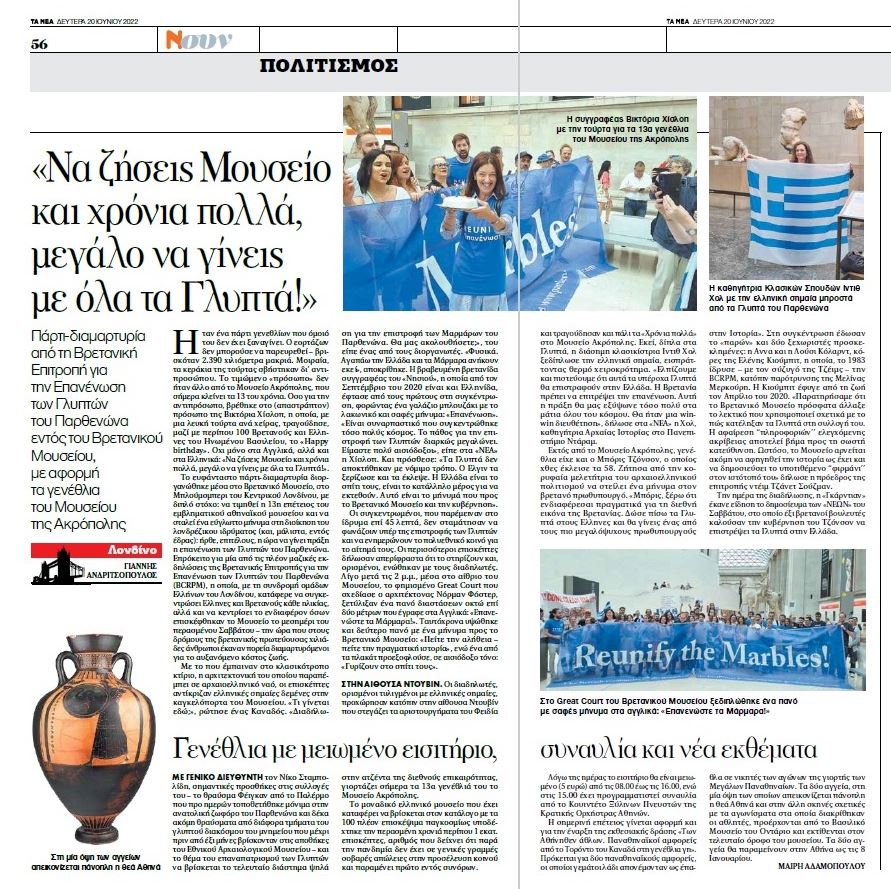
To read the full article in Ta Nea in Greek, follow the link here.
It was a birthday party the likes of which has never happened before. The celebrant could not attend as it was 2,390 kilometres away. Inevitably, the candles of the cake were extinguished by proxy.
The celebrant was none other than the Acropolis Museum, which today celebrates its 13th anniversary. The person that was grinning, was Victoria Hislop, who, with a white cake in her hand, sang, along with about 100 British and Greeks of the United Kingdom, "Happy birthday".

Not only in English, but also in Greek with a twist to the traditional happy birthday words ( and it did rhyme when sung in Greek) :«Να ζήσεις Μουσείο και χρόνια πολλά, μεγάλο να γίνεις με όλα τα Γλυπτά!». Which translated says: "Long live the museum, happy birthday, may you grow older with all of your sculptures reunited!".
The imaginative party-protest was organized inside the British Museum, in Bloomsbury, central London, with the double aim: to commemorate the 13th anniversary of the emblematic Athenian museum and to send an eloquent message to the British Museum, which continues to house half of the surviving and fragmented sculptures from the Parthenon: the time has come, at last, to make the reunification of the Parthenon Sculptures a reality.
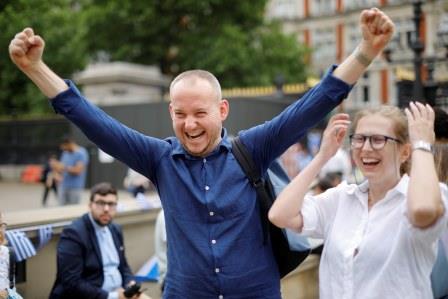
It was one of the most well attended events of the British Committee for the Reunification of the Parthenon Sculptures (BCRPM), which has marked the anniversary of the museum annually. This year the gathering had the assistance of groups of Greeks living in London (invited by Avgoustinos Galiassos and his Greek List), alongside Britons of all ages, but also to the interest of those who visited the Museum on Saturday, while in the streets of the British capital thousands of people marched in protest at the rising cost of living.
As soon as they entered the classic building, the architecture of which reflects that of an ancient Greek temple, visitors saw Greek flags tied to the Gate of the Museum.
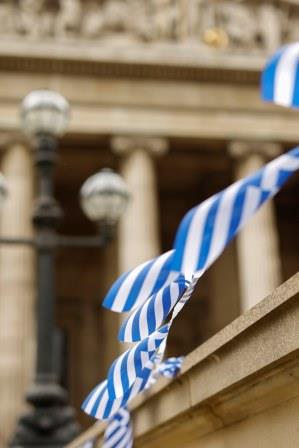
"What's going on here?" asked a Canadian visitor. "A demonstration for the return of the Parthenon Marbles. Will you follow us?" asked one of the organizers. "Of course. I love Greece and the Marbles belong there", replied the Canadian.
The award-winning British author of "The Island" and a Greek citizen since September 2020, arrived and donned the demonstration's official blue T-shirt with the laconic and clear message: "R E U I T E, Επανένωση".

"It's exciting that so many people have gathered today. The passion for the reunification of of the Parthenon Marbles is constantly growing. We are very optimistic," Hislop told Ta Nea. She added: "The sculptures from the Parthenon were not legally acquired. Elgin uprooted them to decorate his ancestral home. Greece is their home, it is the best place for these sculptures to be exhibited. That's my message to the British Museum and the UK government."
The assembled, who remained in the museum for 45 minutes, did not stop chanting in favour of the reunification of the Parthenon Marbles, and made time to also inform the multinational passers-by that wanted to find out more. Most visitors said unequivocally that they supported the reunification and, some, joined in with the protesters.
Shortly after 2 p.m., in the museum's atrium, the famous Great Court designed by architect Norman Foster, an elegant blue banner with white writing measuring eight by two meters was unfurled and the words in English: "Reunify the Marbles!" The British Committee for the Reunification of the Parthenon Marbles, www.parthenon.com
At the same time, a second banner was raised with a message to the British Museum: "!!!COME CLEAN BM!!! #tellthestory, #thetimeisnow. This banner was designed by BCRPM's Chair Janet Suzman for last year's protest and the Acropolis Museum's 12th anniversary. On that Sunday, 20 June 2021, Room 18 was closed and in fact did not re-open until middle of December.
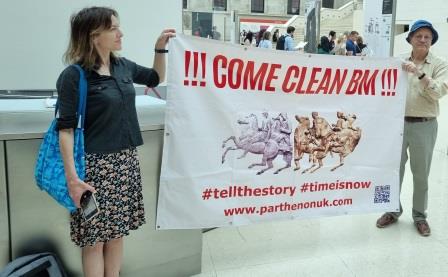
Another couple of placards were held up, including two by the Miliotis family: Dimitra, Fotini, Julia and Chris. The words: "They are coming home", struck a cord.
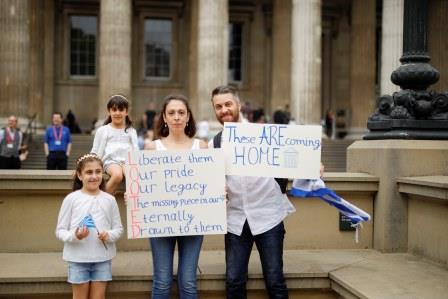
IN THE DUVEEN HALL
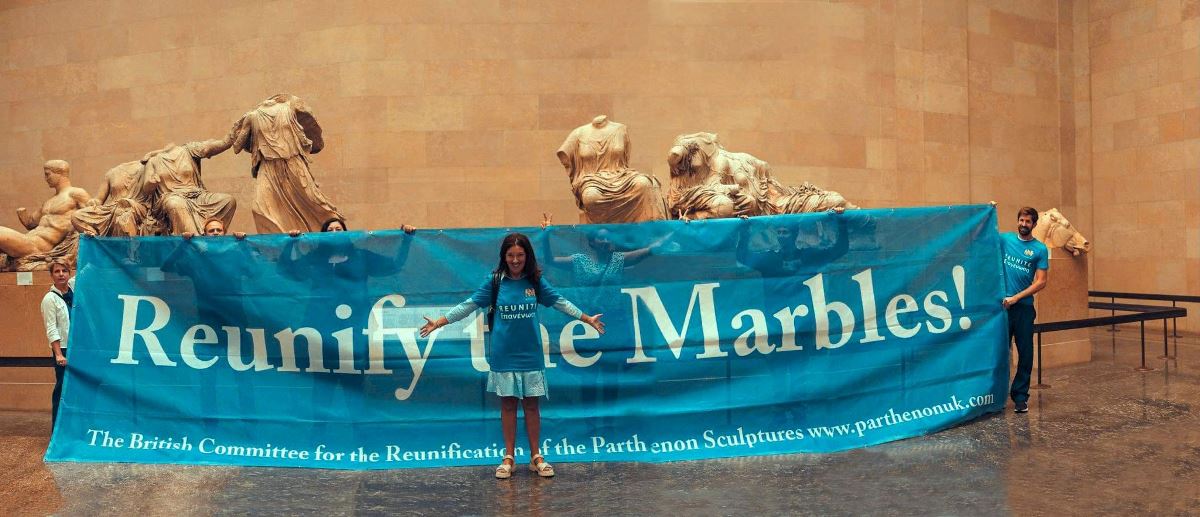
The demonstrators, some wrapped in Greek flags, then proceeded to the Duveen Hall that houses Pheidias' masterpieces and sang again the "Happy Birthday" to the Acropolis Museum.
There, next to the Sculptures, the famous classicist Edith Hall unfolded her scarf which was also a Greek flag, receiving warm applause. "We hope and believe that these wonderful sculptures will be returned to Greece. Britain must allow them to be reunited with their halves in Athens. This act would elevate us so much in the eyes of the whole world. It would be a win-win arrangement," Hall, a professor of Classics and Ancient Greek Literature at Durham University, told Ta Nea.
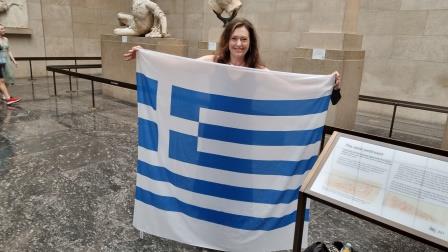
In addition to the Acropolis Museum, Boris Johnson celebrated his 58th birthday on Sunday. I asked the leading professor of ancient Greek literarure to send a message to the British Prime Minister and Edith said: "Boris, I know you are really interested in Britain's international image. Give back the Pathenon sculptures to the Greeks and you will become one of the most magnanimous prime ministers in history".
The demonstration was also attended by two special guests: Anna and Lucy Collard, daughters of Eleni Cubitt. In 1983, Eleni and her architect husband James with the encouragement of Melina Mercouri and Jules Dassin, discussed the idea of a British Committee whilst visiting Evia. BCRPM was founded in October of that year. Mrs Cubitt became Honorary Secretary of the Committee and ran the campaign up to 2012, she sadly passed away in April 2020.
"We noticed that the British Museum recently changed the words it uses to explain how the Sculptures ended up in its collection. Removing words to controll accuracy is a step in the right direction. However, the Museum still refuses to tell the full story as it is and to publish the alleged 'firman'' on its website," said BCRPM's Chair Dame Janet Suzman.
On the same day, Helena Smith wrote in the Guardian mentioning the demonstration and Ta Nea's report on the six British MPs that called on Johnson's government to return